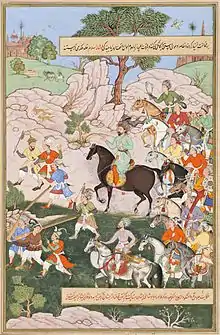Tode Mongke
Tuda Mengu, also known as Tode Mongke, Tudamongke (Mongolian: Тодмөнх/Todmönkh or Tudamönkh, lit. 'Eternal Brightness'), was khan of the Golden Horde, division of the Mongol Empire from 1280 to 1287.
| Tuda Möngke | |
|---|---|
| Khan Shahanshah | |
 Tuda Mengu leading the warriors of the Golden Horde (Mughal painting) | |
| Khan of the Golden Horde Western Half (Blue Horde) | |
| Reign | 1280–1287 |
| Predecessor | Mongke Temur |
| Successor | Tole Buqa |
| Born | unknown date Golden Horde |
| Died | 1287 |
| House | Borjigin |
| Dynasty | Golden Horde |
| Father | Toqoqan |
| Mother | Köchü Khatun |
| Religion | Islam |
Biography
Tode Mongke was the son of Toqoqan (grandson of Batu Khan) and younger full-brother of Mongke Temur. A pious khan, he converted to Islam in 1283.[1] Due to his deep religion, Tudamongke was not aggressive to expand his territory. However, he did keep good contact with Mamluk Sultanate in Egypt against Ilkhanate who was faithless enemy of both states. Rashid Ad-din wrote that he was willing to keep good relations with Kublai khan and released his son Nomoghan to Yuan Court. During his government the influence of Nogai Khan greatly increased in the Golden Horde, and there was a second attack against Hungary in 1284/1285, what was a total disaster for his army. He abdicated in favor to his nephew Tole Buqa in 1287.[2]
Family
He had two wives and several concubines:[3]
- Ariqachi Khatun (from Khongirad tribe)
- Or-Menggü
- Töre Qutluq Khatun (from Alchi-Tatar tribe)
- Chechektü
- Unknown concubine
- Töbetei
See also
References
- Martin, Janet, Medieval Russia, 980-1584, p. 171.
- Cawley, Charles (5 December 2010), Mongols: Batu, son of JOCHI & his --- wife (-Sarai 1255), Medieval Lands database, Foundation for Medieval Genealogy,
- Rashīd al-Dīn Ṭabīb, 1247?-1318. (1971). The successors of Genghis Khan. New York,: Columbia University Press. pp. 109–110. ISBN 0-231-03351-6. OCLC 160563.CS1 maint: extra punctuation (link)
Further reading
- David Morgan, The Mongols
| Preceded by Mongke Temur |
Khan of the Golden Horde 1280–1287 |
Succeeded by Tole Buqa |
